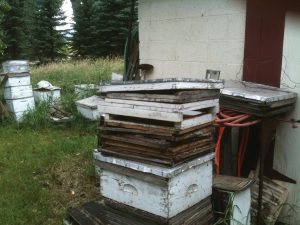By: Peter Sieling
 Dick’s widow, Alice, called me on the first of September about a bee swarm. She probably thought of me because I had attended Dick’s calling hours in the Spring. They must call it “calling hours” because you stand in a line for hours. The line extended out of the church and into the parking area. I didn’t recognize anyone. There was a slideshow that played through several times as the line crept forward at the pace of a garden slug. There’s little Dick sitting in his wagon, young Dick in a Navy uniform, a mature Dick with wife and children, Dick in his veil beside a colony of bees, an elderly Dick surrounded by grandchildren, and finally, there is a professional slide of Dick with Alice. A lifetime compressed into 10 minutes. I introduced myself to the family and made a quick escape.
Dick’s widow, Alice, called me on the first of September about a bee swarm. She probably thought of me because I had attended Dick’s calling hours in the Spring. They must call it “calling hours” because you stand in a line for hours. The line extended out of the church and into the parking area. I didn’t recognize anyone. There was a slideshow that played through several times as the line crept forward at the pace of a garden slug. There’s little Dick sitting in his wagon, young Dick in a Navy uniform, a mature Dick with wife and children, Dick in his veil beside a colony of bees, an elderly Dick surrounded by grandchildren, and finally, there is a professional slide of Dick with Alice. A lifetime compressed into 10 minutes. I introduced myself to the family and made a quick escape.
Alice took me out to the barn to show me the swarm. It was on the wall at ground level. The air was cool and windy, and the bees were a bit sparky. After a couple stings I put on my veil and gloves. Dick had kept some empty hives behind the barn. I took one and tried to persuade them to enter by brushing them down against the hive entrance. They refused. Dick hadn’t actually had bees for several years. He had told me he hoped some wild swarms would occupy the vacant hives, but year after year they remained empty. I don’t understand it. If I have ten empty hives in April, I’ll have eight new swarms by mid July, and I live only seven miles away. At any rate these bees wanted nothing to do with this hive.
What do you do with a Fall swarm? They won’t survive the Winter without feeding, but the same bees in the Spring are worth over hundred dollars plus the cost of picking them up half way across the state. I told Alice I would return late in the afternoon with my bee vac. To myself I thought, “They already know where they are going and will be gone before I return and I’ll save myself the time installing them in a box and feeding them through the Fall only to have a dead hive in Spring.”
They were up under the eaves when I returned, about 10 feet up. Alice said there was a ladder in the barn and she gave me a key. I unlocked the door, found the electric box and turned on the power. All the lights turned on at once. The last time I was here was over a year ago when I bought Dick’s ancient extractor. Everything was as I remembered it – the work bench made from boards laid across hive supers. The honey room door was open and the new stainless steel extracting equipment gleamed under the electric lights. The tractor was still spread out in pieces on the main floor. There was the new riding mower. The old one blew up last year. I remembered the spot in the yard under the apple trees. It looked like a miniature nuclear explosion and Dick had described how he ran for the fire extinguisher (he was on his third pacemaker by this time). “Never buy a mower with the gas tank between your legs,” he told me. The new mower’s tank was under the seat. Either way, I thought, you are blown to Kingdom Come. I almost expected Dick to walk in the door. He left right in the middle, almost as if he went in to dinner and would be back out to put the tractor together this evening.
I found the ladder, propped it up under the swarm and vacuumed the bees, then put away the ladder, shut off the power and locked the door. On the way home I remembered the last time I had talked to Dick. We had sat together at the last Steuben County Honeybee Association banquet. He had unbuttoned his shirt and showed me where his pacemaker protruded from under his skin. His first pacemaker, he told me, was a “seven year”, the second was a “five year” and this one was a “two year.” I had joked that if it quit he could lean against an electric fence. They provide an intermittent jolt, about one per second, and could keep you alive until the paramedics arrived. It doesn’t seem as funny now.
In spite of the unfinished business, Dick seemed to have finished well. Maybe leaving jobs incomplete is part of finishing well. Instead of “whoever dies with the most toys wins,” maybe it should be “whoever dies with the most unfinished business wins.” I’ve attended five beekeeper funerals, and helped widows and families clean up after three of them. Someday it will be my turn.
There’s little Peter sitting in his wagon, young Peter driving a forklift, a mature Peter with wife and children, Peter in his veil beside a colony of bees, an elderly Peter surrounded by grandchildren, and finally, there is a professional slide of Peter with Nancy. That’s my life compressed into 10 minutes.
At home there are still two lively hives in the driveway, one occupied bait hive on the porch roof, a dead battery on the bee fence, a dumpster load of dilapidated beehives, and a young beekeeper sorting through my unfinished business.






